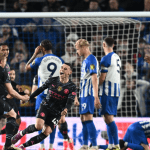Another week, another contentious decision in English football.
This time, it happened in the FA Cup replay between Championship side Bristol City and West Ham. Five minutes in, and with the home side already a goal ahead, referee Darren England failed to award even a foul for what was likely a tackle worthy of a red card by Bristol midfielder Joe Williams on West Ham striker Danny Ings.
This latest blunder cannot be blamed on the VAR – it isn’t used at this stage of the competition, but it’s not easy to understand how the referee could’ve taken what Williams had done as a fair challenge. Furthermore, Darren England is already known for being involved most directly in one of the biggest officiating blunders the game has seen since the introduction of the VAR.
Earlier this season, England was in charge of the VAR as Liverpool were denied a completely legitimate goal by Luis Diaz against Tottenham Hotspur, and that after the Merseysiders were already a man down as England instructed on-field referee Simon Hooper to review his booking of Curtis Jones and upgrade it to a red card. Most bizarrely, what Jones did was slightly milder than Williams’ tackle on Ings, though very similar.
Communication between the people sitting in the VAR room and the on-field referee appears to be the biggest problem. When Darren England and Simon Hooper made their infamous blunder back in September, which incidentally still marks the only defeat Liverpool have suffered in the league to date, England believed Hooper and his assistants had awarded the goal and used the expression “check complete”, which meant they agreed with the on-field decision. How they could’ve missed the linesman’s flag going up for (non-existent) offside and Hooper signaling a Spurs free-kick, rather than a kick-off from the centre of the pitch, remains a mystery.
And once the play had restarted, the protocol prevented them from interfering and having Hooper correct the mistake. It means the protocol was (is) set above the laws of the game and the correct decision being made, which practically defies the reasons for VAR to exist in the first place.
Of course, it’s not only Liverpool who get on the wrong side of incomprehensible decisions, though PGMOL chief Howard Webb recently admitted another mistake at their expense when they weren’t awarded a penalty against Arsenal when Martin Odegaard handled the ball inside the Gunners’ box.
Earlier this season, Manchester City and Spurs played a fascinating match which ended in a 3-3 draw. Interestingly enough, the man who marred this game was another one from the Spurs vs Liverpool fiasco – Simon Hooper.
The score was already 3-3 and the second-half stoppage time was in its fourth minute when Erling Haaland, under a clear foul, still managed to play Jack Grealish in behind the Spurs defence. And just as it looked Grealish was on his way to grab a late winner for City – Hooper’s whistle sounded. He had suddenly decided NOT to play the advantage and to give the foul on Haaland instead. Haaland’s face screaming in anger at Hooper has since become a popular meme on social networks. This situation points to another problem, which has nothing to do with the VAR implementation – sometimes the decisions of the on-field referees are simply mind-numbing and no technology can make amends for the injustice and frustration they cause.
Leaving particular problematic decisions aside now – they’ve been numerous this season alone and mostly well-publicized – the trend of officiating decisions so obviously wrong really puts a huge question mark over the claims of the Premier League being the best in the world. For the moment, players considering a move to the English top flight aren’t put off by it, but unless the problems are dealt with in some way, it’s only a matter of time before it happens. Media in other countries have been ridiculing the VAR application in England practically since its introduction, and the years of experience gone since haven’t made the situation any better.
No lessons have been learned, and the task of improving the standards of officiating in the Premier League remains just as daunting as ever. In fact, the scale of the problem appears larger by the week. There are no easy answers, but it appears clear that unless the 20 clubs, the Premier League and the PGMOL start working together to find some suitable ones, it’ll only get worse with tribalism and managers denying support for one another when a team suffers from an understandably poor decision.
Some tend to point out the fact that officials are human beings and that players and managers make mistakes in their work too. There’s no denying the truth in that, but players get dropped from the team when they underperform, managers get sacked when the results aren’t satisfactory.
The match officials MUST be held accountable for the quality of the work they do as well.
- Soccer News Like
- Be the first of your friends!



















